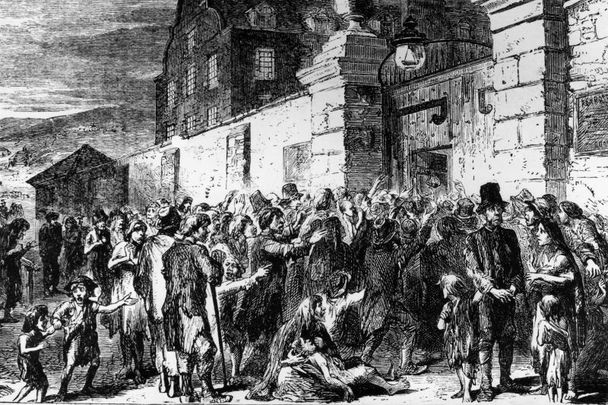Tipperary County Council Library Service holds a vast collection of Poor Law Union Minute Books, Rate Books, and Workhouse Registers, encompassing virtually the entire county.
In January, staff at Tipperary County Council Library Service undertook an ambitious project to commence digitizing its Famine-related Minute Books from the Poor Law Unions in Borrisokane, Cashel, Clogheen, Clonmel, Nenagh, Roscrea, Thurles, and Tipperary.
Tipperary Studies, whose mission is to document and preserve the county's history and aims to offer easy access to Tipperary Library's collections, says: "The Poor Law Guardians, a sort of forerunner to the local elected representatives, met weekly and the findings, reports, and statistics presented at their meetings were recorded in hard-bound minute books."
More than ninety of these Minute Books from the pre-Famine era through the Famine years up to 1852 are now housed with Tipperary Studies. Seventy of the books have so far been scanned, comprising of more than 35,000 images.
We're almost finished digitising our Poor Law Minute books for the famine period.
— Tipperary Studies (@TippStudies) April 22, 2021
90 minute books will be available shortly on the Tipperary Studies Digital Archive at https://t.co/nnujzemmNV.@Tippheritage @TippLib @tippcoco @FethardHistory @IrishWorkhouseC pic.twitter.com/zrkHj65xx9
It is envisaged that these records will be uploaded to the Tipperary Studies digital website by mid-May and they will be freely available to view and read, as well as to download, anywhere in the world.
Tipperary Studies says: "After the initial launch in May, work will continue on the digitization of the remaining minute books, a work that will bring the record collection up into the early decades of the 20th century.
"It is an ambitious project, but one which Tipperary County Council Library Service believes will strike a chord with the Diaspora, for the workhouses of the county were not solely for Tipperary people.
"Names of people from all over Ireland are to be found in the workhouse registers already online. It will take much time to bring the whole project to a conclusion, but it is a project worth embracing, as the current circumstances cause many people to reflect on who they are and where they came from."
Tipperary Studies notes: "These Famine records provide a unique weekly insight into pre-Famine relief and distress in county Tipperary, the emergence of the potato famine itself, and what it meant in the day-to-day workings of the various Poor Law Unions.
"Statistics form a valuable tool in quantifying the level of admissions, relief, and death rates, and the minute books contain a wide range of such figures.
"Names of young girls who were part of the Earl Grey Scheme are also found in some of the minute books. Under this scheme, young girls who had been orphaned during the Famine and who were resident in Irish workhouses were sent to the Australian colonies.
"The entries in many parts of the minute books are often stark, at times cruel and on the whole very sad."
In the recent past, 130 rate books, a sample of those which have survived from the Cashel, Nenagh, and Thurles Poor Law Unions, were digitized and put online on the Tipperary Studies digital platform.
In addition to these records, workhouse admission registers for Cashel, Roscrea, and Thurles were also digitized and uploaded, as well as a death register from the Cashel Union.
"Invaluable resource"
On the digitization project, Dr. John Crowley, University College Cork, and one of the editors of the Atlas of the Great Irish Famine, commented: "The Poor Law Unions and the workhouses are an integral part of the history of the Great Irish Famine (1845-52).
"Such was the extent of the distress in the Famine years that many of the starving clamored to get into the workhouses. The surviving records in many instances provide the names of those who perished within their walls and are a powerful reminder of the devastation wrought by hunger and disease.
"Tipperary County Council Library Services are to be congratulated on this excellent digitization project. Making such records available online for the first time will facilitate not only a much greater public engagement with the history of the Famine but will also prove to be an invaluable resource for researching and understanding its impact at local level."
Dr. Ciarán Reilly, historian of 19th & 20th Century Irish History, Maynooth University, further added: "This is a fantastic project and a massive undertaking by Tipperary County Council Library Service. I am sure it will be brilliant resource for people from Tipperary and further afield.
"Knowing what these records contain, there are so many things which they will be used for, but most important these voluminous accounts will allow for a further and fuller understanding of the experiences of life during the Famine period, the workings of the poor law unions and the now infamous Irish workhouse."

Love Irish history? Share your favorite stories with other history buffs in the IrishCentral History Facebook group.




Comments